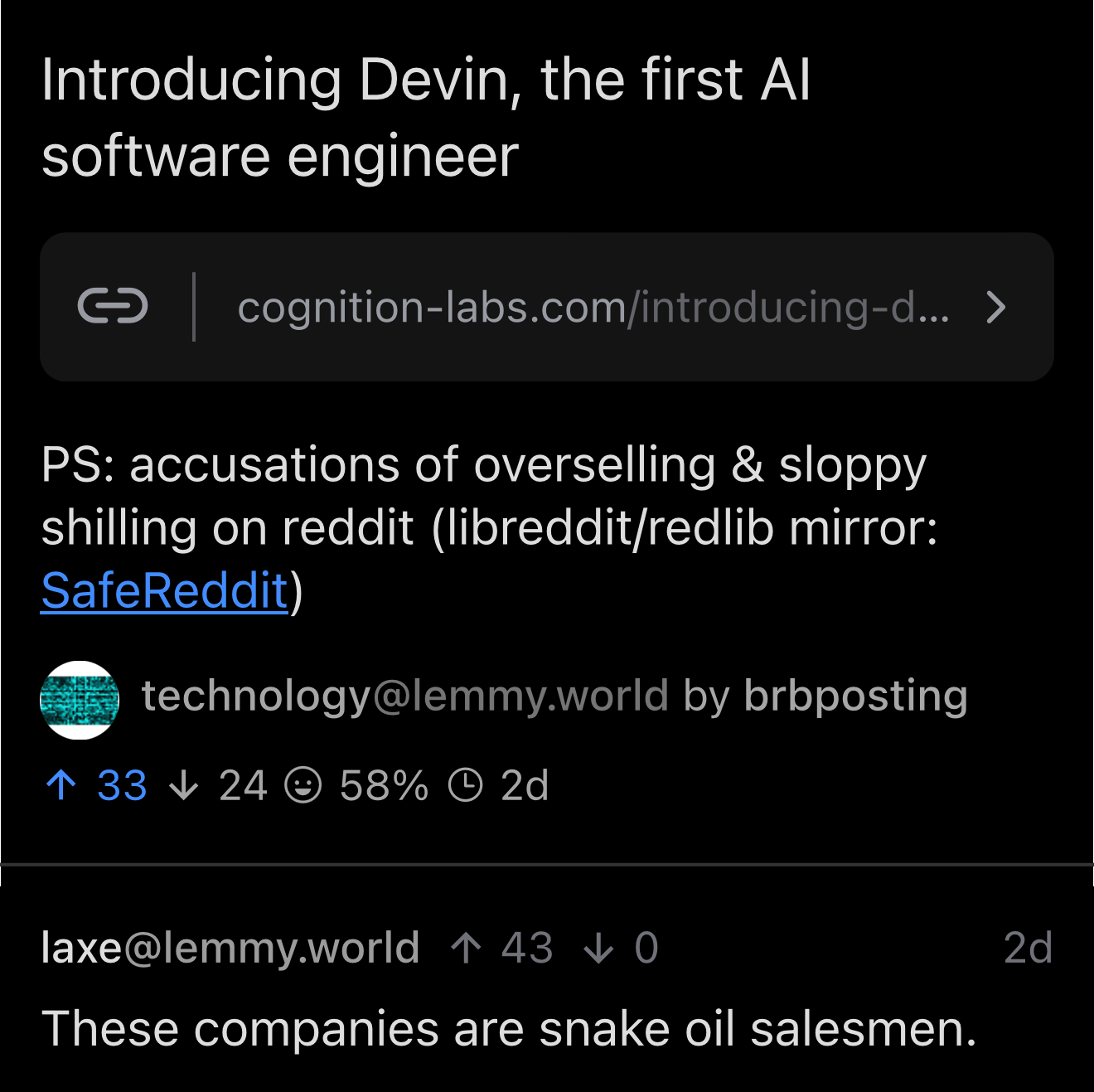“Replacing Talent” is not what AI is meant for, yet, it seems to be every penny-pinching, bean counting studio’s long term goal with it.
Yep AI at best can supplement talent, not replace it.
I’m not a developer, but I use AI tools at work (mostly LLMs).
You need to treat AI like a junior intern… You give it a task, but you still need to check the output and use critical thinking. You cant just take some work from an intern, blindly incorporate it into your presentation, and then blame the intern if the work is shoddy…
AI should be a time saver for certain tasks. It cannot (currently) replace a good worker.
As a developer I use it mainly for learning.
What used to be a Google followed by skimming a few articles or docs pages is now a question.
It pulls the specific info I need, sources it and allows follow up questions.
I’ve noticed the new juniors can get up to speed on new tech very quickly nowadays.
As for code I don’t trust it beyond snippets I can use as a base.
JFC they’ve certainly got the unethical shills out in full force today. Language Models do not and will never amount to proper human work. It’s almost always a net negative everywhere it is used, final products considered.
Then you’re using it wrong.
Its intended use is to replace human work in exchange for lower accuracy. There is no ethical use case scenario.
It’s intended to show case its ability to generate text. How people use it is up to them.
As I said it’s great for learning as it’s very accurate when summarising articles / docs. It even sources it so you can read up more if needed.
It’s clutch for boring emails with several tedious document summaries. Sometimes I get a day’s work done in 4 hours.
Automation can be great, when it comes from the bottom-up.
Honestly, that’s been my favorite - bringing in automation tech to help me in low-tech industries (almost all corporate-type office jobs). When I started my current role, I was working consistently 50 hours a week. I slowly automated almost all the processes and now usually work about 2-3 hours a day with the same outputs. The trick is to not increase outputs or that becomes the new baseline expectation.
I am a developer and that’s exactly how I see it too. I think AI will be able to write PRs for simple stories but it will need a human to review those stories to give approval or feedback for it to fix it, or manually intervene to tweak the output.
I do think given time, AI can improve to the level that it can do nearly all of the same things junior level people in many different sectors can.
The problem and unfortunate thing for companies I forsee is that it can’t turn juniors into seniors if the AI “replaces” juniors, which means that company will run out of seniors with retirement or will have to pay piles and piles of cash for people just to hire the few non-AI people left with industry knowledge to babysit the AIs.
It’s very short sighted, but capitalism doesn’t reward long term thinking.
The problem is the crazy valuations of AI companies is based on it replacing talent and soon. Supplementing talent is far less exciting and far less profitable.
Current AI*
I don’t see any reason to expect this to be the case indefinitely. It has been getting better all the time and lately been doing so at a quite rapid pace. In my view it’s just a matter of time untill it surpasses human capabilities. It can already do so in specific narrow fields. Once we reach AGI all bets are off.
Maybe this comment will age poorly, but I think AGI is a long way off. LLMs are a dead-end, IMO. They are easy to improve with the tech we have today and they can be very useful, so there’s a ton of hype around them. They’re also easy to build tools around, so everyone in tech is trying to get their piece of AI now.
However, LLMs are chat interfaces to searching a large dataset, and that’s about it. Even the image generators are doing this, the dataset just happens to be visual. All of the results you get from a prompt are just queries into that data, even when you get a result that makes it seem intelligent. The model is finding a best-fit response based on billions of parameters, like a hyperdimensional regression analysis. In other words, it’s pattern-matching.
A lot of people will say that’s intelligence, but it’s different; the LLM isn’t capable of understanding anything new, it can only generate a response from something in its training set. More parameters, better training, and larger context windows just refine the search results, they don’t make the LLM smarter.
AGI needs something new, we aren’t going to get there with any of the approaches used today. RemindMe! 5 years to see if this aged like wine or milk.
Yeah LLMs might very well be a dead-end when it comes to AGI but just like chatGPT seemingly came out of nowhere and took the world by surprise, this might just aswell be the case with an actual AGI aswell. My comment doesn’t really make any claims about the timescale of it but rather just tires to point out the inevitability of it.
How does this amazing prediction engine discovery that basically works like our brain does not fit in a larger solution?
The way emergent world simulation can be found in the larger models definitely point to this being a cornerstone, as it provides functional value in both image and text recall.
Nevermid that tools like memgpt doesn’t satisfy long term memory and context windows doesn’t satisfy attention functions properly, I need a much harder sell on LLM technology not proving an important piece of agi
I didn’t say it wasn’t amazing nor that it couldn’t be a component in a larger solution but I don’t think LLMs work like our brains and I think the current trend of more tokens/parameters/training LLMs is a dead-end. They’re simulating the language area of human brains, sure, but there’s no reasoning or understanding in an LLM.
In most cases, the responses from well-trained models are great, but you can pretty easily see the cracks when you spend extended time with them on a topic. You’ll start to get oddly inconsistent answers the longer the conversation goes and the more branches you take. The best fit line (it’s a crude metaphor, but I don’t think it’s wrong) starts fitting less and less well until the conversation completely falls apart. That’s generally called “hallucination” but I’m not a fan of that because it implies a lot about the model that isn’t really true. Y
You may have already read this, but if you haven’t: Steven Wolfram wrote a great overview of how GPT works that isn’t too technical. There’s also a great sci-fi novel from 2006 called Blindsight that explores the way facsimiles of intelligence can be had without consciousness or even understanding and I’ve found it to be a really interesting way to think about LLMs.
It’s possible to build a really good Chinese room that can pass the Turing test, and I think LLMs are exactly that. More tokens/parameters/training aren’t going to change that, they’ll just make them better Chinese rooms.
Thanks, I’ll check those out. The entire point of your comment was that llm is a dead end. The branching as you call it is just more parameters which approach, in lower token models a collapse. Which is why more tokens and larger context does improve accuracy and why it does make sense to increase them. LLMs have also proven to in some cases have what you call reason and what many call reason but which is not a good word for the error. Larger models provide a way to stimulate the world which in turn gives us access to the sensing mechanism of our brain, which is to stimulate and then attend to disparages between the simulation and actual. This in turn gives access to action which unfortunately is not very well understood. Simulation, or prediction, is what our brains constantly do to be able to react and adapt to the world without massive timing failure and massive energy cost, for instance consider driving where you focus on unusual sensing and let action be an extension of purpose by just allowing constant prediction to happen where your muscles have already prepared to commit even precise movements due to enough practice with your “model” of how wheel and foot apply to the vehicle.
*Simulate, not stimulate lol
Not even that, it’s a tool. Like the same way Photoshop, or 3ds max are tools . You still need the talent to use the tools.
https://www.cognition-labs.com/introducing-devin There are people out there deliberately working to make that vision a reality. Replacing software engineers is the entire point of Devin AI.
I saw this the other day and I’m like well fuck might as well go to trade school before it gets saturated like what happened with tech in the last couple years.
Yeah, the sad thing about Devin AI is that they’re clearly doing it for the money, they have absolutely no intentions on bettering humanity, they just want to build this up and sell it off for that fat entrepreneur paycheck. If they really cared about bettering humanity they would open it up to everyone, but they’re only accepting inquiries from businesses.
One single comment when I posted this on the technology community:

sed “s/studio’s/tech industry c-suite’s/“As an engineer, the amount of non-engineering idiots in tech corporate leadership trying to apply inappropriate technical solutions to something because it became a buzzword is just absurdly high.
Just make the modulus of elasticity more agile. Problem solved!
But that’s pretty much why AI is developed.
It was more like a scientific discovery
Not really, no, all of the current models built to intended scale are selling it as a product, especially OpenAI, Microsoft, and Google. It was built with a purpose and that purpose was to potentially replace expensive human assets.
Yes, it was. Like all scientific discoveries several corporations started building proprietary products. You are wrong that it was built with that purpose.
deleted by creator
The article doesn’t say much. So I checked the source for more information. It doesn’t say much more, but IMO in a much better way, in two concise paragraphs. In the sourced financial report, it is in the intro, two paragraphs:
An example R&D initiative, sponsored by the Innovation team was Project Ava, where a team, initially from Electric Square Malta, attempted to create a 2D game solely using Gen AI. Over the six-month process, the team shared their findings across the Group, highlighting where Gen AI has the potential to augment the game development process, and where it lags behind. Whilst the project team started small, it identified over 400 tools, evaluating and utilising those with the best potential. Despite this, we ultimately utilised bench resource from seven different game development studios as part of the project, as the tooling was unable to replace talent.
One of the key learnings was that whilst Gen AI may simplify or accelerate certain processes, the best results and quality needed can only be achieved by experts in their field utilising Gen AI as a new, powerful tool in their creative process. As a research project, the game will not be released to the public, but has been an excellent initiative to rapidly spread tangible learnings across the Group, provide insights to clients and it demonstrates the power and level of cross-studio collaboration that currently exists. Alongside Project Ava, the team is undertaking a range of Gen AI R&D projects, including around 3D assets, to ensure that we are able to provide current insights in an ever- evolving part of the market
The central quote and conclusion being:
One of the key learnings was that whilst Gen AI may simplify or accelerate certain processes, the best results and quality needed can only be achieved by experts in their field utilising Gen AI as a new, powerful tool in their creative process.
Which is obvious and expected for anyone familiar with the technology. Of course, experiments and confirming expectations has value too. And I’m certain actually using tools and finding out which ones they can use where is very useful to them specifically.
The overall point may be relatively obvious, but the details are not.
Which steps of which processes is it good at, and which not? What can be easily integrated into existing tooling? Where is is best completely skipped?
Yes, exactly. That’s what I was referring to in my last sentence.
Honestly it sounds extremely generous by saying the best results can be achieved by experts with GenAI. In my opinion the best results can be achieved without it entirely.
Folks really didn’t understand how AI will work. It’s not going to be some big we’re dropping 1000 people.
It’s going to reduce demand over time.
And in that regard it’s no different than any other productivity tool or automation, I have seen software being bought that immediately Eliminated 80 odd jobs.
I’ve heard it as “No one is losing their job to AI, but they will lose their jobs to someone who is using AI.”
Think of AI like computers and spreadsheet software in the early 80s. I bet a lot of accountants were pretty freaked out about what this new technology was going to mean for their jobs.
Did technology replace those accountants? No, but companies probably didn’t need as many accountants as they did before. AI will likely reduce the number of programmers that a company needs, but it won’t eliminate them
Really I think it’s kind of the opposite. There are plenty of jobs awaiting higher skilled labor. Just as Excel didn’t hurt accounting, it gave many people who weren’t trained I’m accounting to take on more tasks than they would have.
Case in point: I’m using ChatGPT to help me write cover letters. I make sure to proofread them and sometimes it hallucinates my expertise, but it makes it a lot faster.
Also not going to happen. It’s massively overrated.
I mean that’s already happening at some big companies now.
Will it last? My guess is no, but they’ll enjoy saving the money that they would pay human beings in the mean time.
My hope is just that they’ll suffer losses due to a drop in product quality and start struggling, but let’s face it, the big tech companies are almost never the ones’ that are actually hurt by their decisions.
deleted by creator
It will start with going from 5 writers to 3, or going from 10 animators to 6.
Then 10 years from now as it gets more advanced we will be down to maybe 1 writer and 2 animators.
going from 10 animators to 6
It’s still crazy to me that like half of Across the Spider-Verse was AI generated
deleted by creator
You’ve just said all corporations view it this way. Think about what you said. You have taken articles from a few businesses and applied that across the board.
Removed by mod
It’s going to reduce demand over time.
At least in video games it’s probably going to be more that scope increases while headcount stays the same.
If most of your budget is labor, and the cost of the good is fixed, with the number of units sold staying around the same, there’s already an equilibrium.
So companies can either (a) reduce headcount to spend a few years making a game comparable to games today when it releases, or (b) keep the same headcount and release a game that reviews well and is what the market will expect in a few years.
So for example, you don’t want to reduce the number of writers or voice actors to keep a game with a handful of main NPCs and a bunch of filler NPCs when you can keep the same number of writers and actors but extend their efforts to straight up have entire cities where every NPC has branching voiced dialogue generated by extending the writing and performances of that core team.
But you still need massive amounts of human generated content to align the generative AI to the world lore, character tone, style of writing, etc.
Pipelines will change, scope will increase, but the number of people used for a AAA will largely stay the same and may even slightly grow.
Folks really don’t understand how AI will work. It’s not going to be
somebigwe’re dropping 1000 people.
ai automates the behavior of an average agent, not a talented one
And when it doesn’t it still tells you that it does, incapable of correction.
Unless you specify that you want a talented output. A lot of people don’t realize that you need to tell AIs what kind of output you want them to give you, if you don’t then they’ll default to something average. That’s the cause of a lot of disappointment with tools like ChatGPT.
Ahhh so the secret to using ChatGPT successfully is to tell it to give you good output?
Like “make sure the code actually works” and “don’t repeat yourself like a fucking idiot” and “don’t hallucinate false information”!
Unironically yes, sometimes. A lot of the best works which its training samples are based on cites the original poster’s qualifications, and this filters into the model where asking for the right qualifications directly can influence it to rely more on high quality input samples when generating its response.
But it’s still not perfect, obviously. It doesn’t make it stop hallucinating.
Yeah, you still need to give an AI’s output an editing and review pass, especially if factual accuracy is important. But though some may mock the term “prompt engineering” there really are a bunch of tactics you can use when talking to an AI to get it to do a much better job. The most amusing one I’ve come across is that some AIs will produce better results if you offer to tip them $100 for a good output, even though there’s no way to physically fulfill such a promise. The theory is that the AI’s training data tended to have better stuff associated with situations where people paid for it, so when you tell the AI you’re willing to pay it’ll effectively go “ah, the user is expecting good quality.”
You shouldn’t have to worry about the really quirky stuff like that unless you’re an AI power-user, but a simple request for high-quality output can go a long way. Assuming you want high quality output. You could also ask an AI for a “cheesy low-quality high-school essay riddled with malapropisms” on a subject, for example, and that would be a different sort of deviation from “average.”
Absolutely, it’s one of the first curious things you discover when using them, such as stable diffusion “masterpiece” or the famous system prompt leaks from proprietary llms
It makes sense in how it works but in proprietary use it is mostly handled for you
Finding the right words and amount is a hilarious exercise that provides pretty good insight in the attention mechanics
Consider the “let’s work step by step”
This proved a revolutionary way to system the coders as they then will structure the output better, there’s then more research that happened around why this is so amazingly effective at making the model proof check itself
Predictions are obviously closely related to the action part of our brains as well, so it makes sense that it would help when you think about it
Literally yes.
For example about a year ago one of the multi step prompt papers that improved results a bit had the model guess what expert would be best equipped to answer the question in the first pass and then asked it to answer the question as that expert in the second pass and it did a better job than trying to answer it directly.
The pretraining is a regression towards the mean, so you need to bias it back towards excellence with either fine tuning or in context learning.
So I need to praise it and call it a good boy?
What? You didn’t know ChatGPT has a praise kink?
Literally yes. You’ll see that OpenAI’s system prompts say ‘please’ and Anthropic’s mentions that helping users makes the AI happy.
Which makes complete sense if you understand what’s going on with how the models actually work and not the common “Markov chain” garbage armchair experts spout off (the self attention mechanism violates the Markov property characterizing Markov chains in the first place, so if you see people refer to transformers as Markov chains either they don’t know what they are taking about or they think you need an oversimplified explanation).
I always love watching you comment something that’s literally true regarding LLMs but against the groupthink and get downvoted to hell.
Clearly people aren’t aware that the pretraining pass is necessarily a regression to the mean and it requires biasing it using either prompt context or a fine tuning pass towards excellence in outputs.
There’s a bit of irony to humans shitting on ChatGPT for spouting nonsense when so many people online happily spout BS that they think they know but don’t actually know.
Of course a language model trained on the Internet ends up being confidently incorrect. It’s just a mirror of the human tendencies.
Yeah, these AIs are literally trying to give us what they “think” we expect them to respond with.
Which does make me a little worried given how frequently our fictional AIs end up in “kill all humans!” Mode. :)
Which does make me a little worried given how frequently our fictional AIs end up in “kill all humans!” Mode. :)
This is completely understandable given the majority of discussion of AI in the training data. But it’s inversely correlated to the strength of the ‘persona’ for the models given the propensity for the competing correlation of “I’m not the bad guy” present in the training data. So the stronger the ‘I’ the less ‘Skynet.’
Also, the industry is currently trying to do it all at once. If I sat most humans in front of a red button labeled ‘Nuke’ every one would have the thought of “maybe I should push that button” but then their prefrontal cortex would kick in and inhibit the intrusive thought.
We’ll likely see layered specialized models performing much better over the next year or two than a single all in one attempt at alignment.
Interestingly enough, I’ve started adding something similar to my AI prompts because a Lemmy user had it in theirs and I liked their images.
No shit.
deleted by creator
Using AI to automate super tedious and repetitive tasks is great and everybody should start doing it
Yeah, there’s many times I type “class for:” followed by a a dump of SQL, JSON, XML or whatever and it’ll make a class with properties named correctly with the right types. I still have to figure out tricky data relationships and that sort of thing, but the boring tasks of creating interfaces to databases and objects for serializing stuff goes a lot faster now.
So a much larger percentage of my time is devoted to solving problems rather than doing all the boring grunt work usually involved with getting data in and out of the app.
God I must be an idiot. I was trying to design my own db for simple flash cards with multiple tags, where tags can be stacked with each other to auto build flash card decks. Even with chatgpt helping me build out the interfaces and some functions I was not getting the functionality I wanted at all.
Yeah current gen AI is still very much a human tool - an assistant - maybe a companion if you stretch it to it’s edge. I for one welcome a personal AI buddy
Too many people see AI doing work as an either or thing. AI won’t replace people outright, it’ll just reduce the amount of people you need.
Which in turn replaces people. What happens if a person is 50 percent more productive with AI? Is the company going to let them simply have 50% of the workload they would before, or will they lay off the other unneeded employees?
deleted by creator
Duh.
That’s a great image.
RIP Norm.
The game will not be released to the public as it was just a research project, and Keywords didn’t provide any additional information about what type of 2D game it created.
So we just have to trust them on this? Yeah, no.
I am astonished by an established, commercial website having good structure.
It looks like a documentation website. Sidebar with clear categories and navigation. I really like it.
“House made entirely of cement is a failure because you still need doors and windows and stuff.”
Well, I’m glad somebody did the experiment at least.
Huh, would you look at that.
This is a quote that should end in ‘yet’. I am very confident in saying there will be an AAA game released that will be designed and implemented 95%+ by a machine. I am less confident in providing a timeline. If you consider the history of machine learning is ~70 years old (in one sense, one can argue other dates) and you plot the advances from tic-tac-toe to what machines can do today (chess being a prime example), it doesn’t take much vision to see that it won’t be but a matter of time before this is a real thing.
Sure it may produce a game but much of what makes a game good is making it fun and memorable. If we can eventually create a general AI then absolutely I think such a thing is possible. Otherwise it will be a copypasta mishmash and having a cohesive and fluent design is a huge if.
lmfao
This kid is not going places.
you’re right, you won’t.
Add “, yet” to the headline and come back in a year or two.
Currently AI may fail to produce a video game, but so was the case for images, videos, and texts only a few years ago.
Failure is a good thing because it’s preceded by attempt.
Yeah. Just because it can’t do it now, doesn’t mean it won’t ever. And also refer to my other comment for how this is a bad study as they didn’t even provide any details on the game itself, let alone release the game. But anyone can do a similar study for themselves at home, since AI is free to use!
Not yet able to replace talent
They forgot to import the talent module.

















